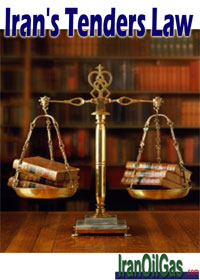 Preface:
Preface:
Since the passing of the General Audit Law (GAL) by Iran’s Parliament (Majlis) in 1987, no attempt had been made to pass a bill for tender holding procedures, refer to in GAL, until year 2002 when Majlis passed the much overdue Tenders Law.
Tenders Law has been prepared on the basis of the United Nations Commission on International Trade Law (UNCITRAL) legal pattern, utilizing the experiences of other countries in this regard.
The Law pursues two basic principles of “transparency” and “guaranteeing the rights of tender participants”. The World Bank released a report on the Law in Feb 2004, calling it as one of the most significant achievements of legislative action in Iran stressing on its contents aimed at “transparency” and creating “competitiveness”.
Unlike the previous laws, the procedures and stages involved in the tenders are thoroughly explained and clarified in this Law. Although some experts find the Law very bulky and complex, nevertheless some useful bureaucratic tools have been foreseen in the Law.
One of the issues addressed in the Law is the qualitative assessment of the tender participants before inviting them to the tender. This helps the tender holder to select contractors/producers capable of undertaking and fulfilling relevant commitments.
Another issue tackled by the Law is the correlation between price and quality. This issue constitutes a major challenge in supplying goods and equipments and also in selecting contractors and consultants. The past laws were more lenient but had failed to explicitly specify the way of incorporating quality of the commodities and services into their prices. Cheapness was the criterion for purchasing. But this has no real economic rationale.
This issue has been dealt with in the Tenders Law in the concept of “appropriate price”. In the past, there were some concerns about use of “appropriate price” or “balanced price”. It was feared that applying the criteria would violate the rights of some participants on technical scores. However, according to this Law, these criteria should be specified and made public in advance. It also stresses that any technical decision should be made before opening the financial packages.
Given the global experiences during the past few years, a new classification should be provided for the economic transactions between the State and the private sector, in line with Iran’s domestic situation and the role it is playing in the international economy.
The Tender Law pattern is somehow compatible with the UNCITRAL legal pattern developed in the UN. This enables Iran to gain the much-needed acceptable position in international transactions.
Iran’s Management and Planning Organization (MPO) have been assigned the task of preparing the Executive Regulation of Article 23 of the Law. In general, the Law is inclusive of five Regulations, one of which pertains to preparing a law for passing judgments in tender-related affairs. This has to be approved by Majlis and it will have its own special Executive Regulation. MPO is obliged to prepare the other four Regulations as well, requiring the collaboration of the Executive bodies and the Ministry of Finance and Economic Affairs. The said four regulations are as follows:
The regulation for Information and Documentation System of Tenders
The regulation for Qualitative Assessment of Tender Participants
The regulation for holding Limited Tenders
The regulation for acquiring consulting services.
In view of the above mentioned facts/points and with the intention of acquainting foreign potential participants in Iranian tenders, particularly in the oil and gas sectors, with the full details of the applicable law, Iran Oil Gas Network has embarked on preparing an authentic translation of the ‘Tenders Law’, which follows: